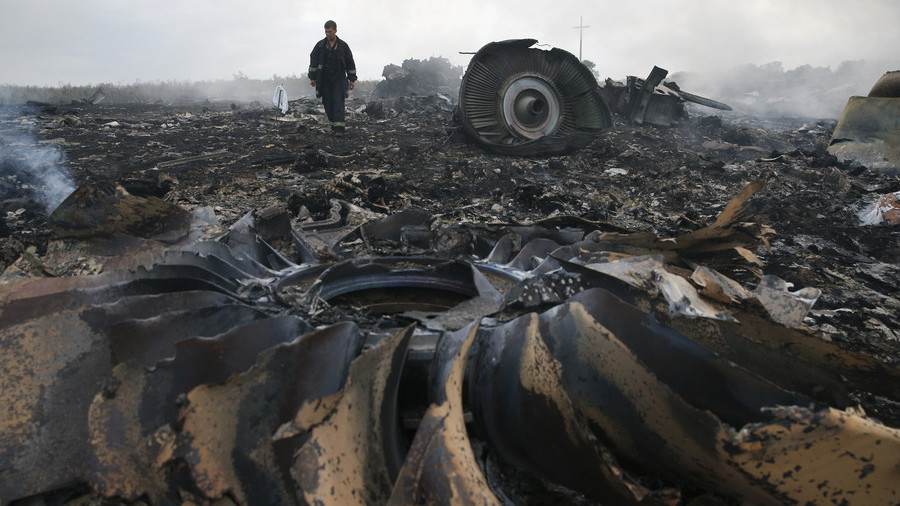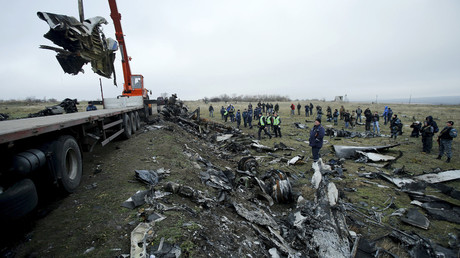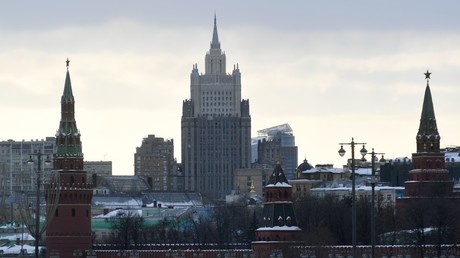Russia ‘absolutely’ rejects Dutch & Aussie accusations it’s responsible for MH17 downing

Moscow has rejected any involvement in the crash of flight MH17 in Ukraine after the Netherlands and Australia declared Russia “responsible” for the deployment of a BUK missile system that downed the jet in 2014.
Moscow neither accepts nor trusts the results of an international investigation into the MH17 crash as it was not allowed to take part in it, according to the Russian president’s spokesman Dmitry Peskov.
“Of course, without being able to be a full participant, Russia does not know to what extent the results of this work can be trusted," he said.
Peskov echoed the position of the Russian president Vladimir Putin who earlier said that, although Ukraine was included in the probe, Russia was barred from participating in establishing the truth.
Asked if he can confirm that Russia vehemently denies any involvement in the MH17 downing, Peskov replied “absolutely.”
Earlier on Friday, Amsterdam and Canberra said Russia is “responsible for its part in the downing of flight MH17” following a Thursday press conference of the Dutch-led International Investigation Team (JIT). The latter concluded that a BUK missile system from a Russian 53rd brigade was transported to eastern Ukraine and used to down the passenger plane with more than 300 people onboard. The system was then said to have returned to Russia.
“The [Dutch] government is now taking the next step by formally holding Russia accountable,” Dutch Minister of Foreign Affairs Stef Blok said in a statement. However, the Russian military earlier said that not a single weapons system crossed the border.
MH17 tragedy may be used to achieve political goals – Lavrov
The country's Foreign Minister Sergey Lavrov stressed that Moscow would not reject closer cooperation on the MH17 probe, but only if the data it provides is included as well. He also compared the case with the Skripal scandal, in which London made groundless allegations and pinned the blame on Moscow, but failed to provide any proof.
“If our partners have decided to speculate on this case, when it comes to the most serious human tragedy, the death of hundreds of people, to achieve their political goals, I leave it on their conscience,” Lavrov said.
Despite the JIT claiming that it conducted a separate probe, it did not move any further than the British investigative group Bellingcat – some reports of which came under fire and were refuted by Russian activists. Among other flaws in the earlier Bellingcat claims was the assertion that the Ukrainian Army had no Buk systems in the conflict area. However, in a countering statement, Russian activists presented reports from the Ukrainian media itself showing Buk missiles in the area prior to the downing of the plane.
Bellingcat’s online investigations have previously raised questions regarding their accuracy. After the group’s founder, Eliot Higgins, published one of his reports on Syria, he was asked to discuss his findings with prominent MIT physicist Theodore Postol. However, the blogger declined the debate and insulted the scientist, triggering an avalanche of criticism on Twitter.
The allegation that the missile belonged to the Russian military had earlier been debunked by the Buk manufacturer, Almaz-Antey. Its real-time experiment showed that the projectile which hit MH17 (Boeing 777) was from an earlier generation and is no longer in service with the Russian military. It was found that the plane was likely shot down using an old 9M38 missile, not the newer type 9M38M1 with distinct butterfly-shaped metal fragments, which were allegedly recovered by the Dutch Safety Board.
Moreover, Almaz-Antey’s findings, which analyzed the angle from which the projectiles entered the cockpit of the ill-fated flight, showed that the most probable location of the launch site could be only on Kiev-controlled territory. Untampered Russian radar data provided by Moscow led to similar conclusions.
Since the collapse of the Soviet Union in 1991 Ukrainian forces kept around 20 Buk systems, according to the Russian Defense Ministry. The military also stressed that Moscow has not supplied any new missiles to Ukraine since then.





Geen opmerkingen:
Een reactie posten